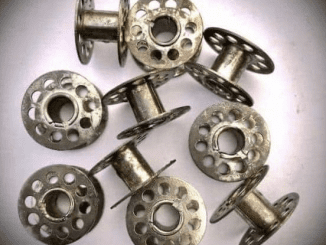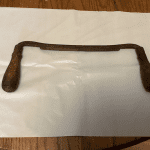In today’s world, where parenting decisions are often under the microscope, Alexis Solis, a stay-at-home mom from Los Banos, California, has ignited a heated online debate. Solis, who is also a former behavioral analysis therapist, recently shared a TikTok video of herself securing a leash to her daughter’s wrist while shopping at a grocery store. The video quickly went viral, amassing over 12 million views and drawing both harsh criticism and strong support. While some viewers were appalled by the sight of a child on a leash, others defended Solis, citing the importance of child safety in public spaces.
The Viral Video: A Mother’s Decision Under Fire

In the viral TikTok video, Alexis Solis can be seen calmly asking her daughter to extend her wrist so she can attach a leash. For Solis, this was a routine safety measure to ensure her child stayed close in a busy environment. However, the internet’s response was anything but routine. The video quickly racked up millions of views, with a flood of comments expressing outrage. One user harshly commented, “I hope they leash her when she’s 50,” while another simply stated, “I hate those.”
Despite the negative feedback, Solis stood by her decision. She explained that the leash was not about controlling her child but rather protecting her in potentially dangerous situations. As a mother of two and someone with a background in behavioral analysis, Solis felt the need to prioritize safety over public opinion.
Why Alexis Solis Believes in Using a Toddler Leash
Faced with a wave of criticism, Alexis Solis took to social media to clarify her stance on using a toddler leash. She explained that her decision was deeply rooted in her experiences as both a mother and a therapist. Solis emphasized that the leash was a lifesaver for children who are prone to running off, a behavior known as “eloping” in the context of children with autism.
Drawing from her professional experience, Solis noted that children with certain behavioral challenges might be more likely to wander off in public spaces, putting themselves at risk. The leash, in her view, is a simple tool that can prevent potentially traumatic incidents for both the child and the parent. Solis expressed her belief that the leash could have been a valuable resource for many parents she worked with during her therapy career.
A Father’s Perspective: From Skepticism to Support
Alexis Solis’s commitment to her children’s safety is also deeply personal. She revealed that her need to be hyper-vigilant stems from a traumatic experience she endured as a child. Solis was sexually assaulted at a young age, an event that profoundly shaped her views on safety and awareness. As a mother, these protective instincts have only intensified, leading her to adopt measures like the toddler leash to keep her daughters safe.
Solis’s past experiences underscore the complexity of parenting decisions and the deeply personal factors that influence them. While some might view the leash as excessive, for Solis, it’s a necessary precaution born out of a desire to protect her children from the dangers she knows all too well.
Expert Opinions: The Debate Over Toddler Leashes
Interestingly, Alexis Solis’s husband initially shared the skepticism that many viewers expressed. At first, he wasn’t convinced that the leash was necessary. However, after witnessing firsthand the challenges of keeping their energetic children safe in public, he changed his mind. Now, he fully supports his wife’s decision, understanding that their children’s safety comes before concerns about public perception.

This shift in perspective highlights a common experience among parents—what might seem unnecessary or extreme in theory often makes perfect sense in practice. The Solis family’s experience demonstrates how parenting decisions are frequently reassessed and adjusted based on real-world challenges.
Navigating Public Judgment and Parenting Choices
The controversy surrounding Alexis Solis’s use of a toddler leash taps into a broader societal debate about parenting choices and public judgment. On one hand, some argue that a leash demeans the child, likening it to treating them like a pet rather than a person. Critics fear that such measures could harm a child’s self-esteem or hinder their development of autonomy and self-control.
On the other hand, supporters of the leash argue that it’s a practical tool that prioritizes safety in potentially dangerous situations. They point out that busy public spaces, such as grocery stores, can be overwhelming for both parents and children, and the leash provides peace of mind by keeping the child close.
Expert Opinions: Alternative Approaches to Child Safety
Psychologists and child development experts have weighed in on the debate, offering alternative perspectives on how to keep children safe without resorting to a leash. One psychologist suggested that instead of using a leash, parents could consider strapping their child into a stroller or using a backpack with a tether. These methods, the expert argued, offer a balance between safety and allowing the child a sense of independence.
Another concern raised by experts is the potential impact of the leash on a child’s self-esteem. Publicly pulling or dragging a child, they argue, could be embarrassing and lead to negative associations with being restrained. Instead, experts recommend fostering self-control and teaching children to follow rules and guidance in public spaces.
Conclusion: A Mother’s Right to Choose What’s Best
The debate over Alexis Solis’s use of a toddler leash is a microcosm of the larger challenges faced by parents today. While the internet can be quick to judge, the reality is that parenting is deeply personal and influenced by a myriad of factors, including past experiences, professional knowledge, and the unique needs of each child. For Solis, the leash is not about control—it’s about safety and peace of mind in a world that can be unpredictable and dangerous.
As parents navigate these decisions, it’s important to remember that what works for one family might not work for another. Whether it’s using a leash, a stroller, or simply holding a child’s hand, the ultimate goal is the same: to keep our children safe while helping them grow into confident, independent individuals.


